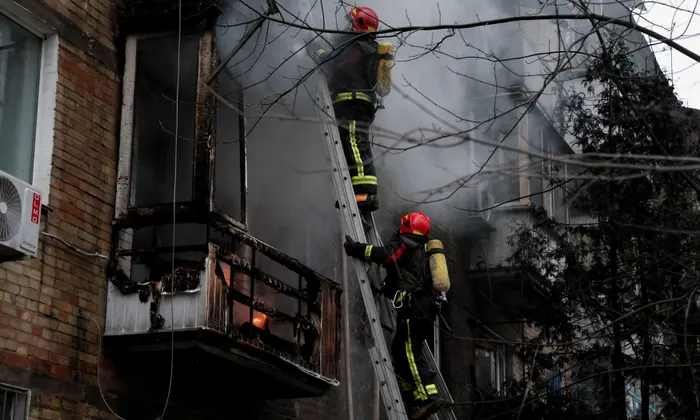Russia launches fresh missile strikes across Ukraine as G20 leaders meet

Russia launched a wave of missile strikes across Ukraine on Tuesday, leaving many cities without power, as G20 leaders met in Bali.
Ukrainian authorities said it was another planned attack aimed at the country’s energy infrastructure facilities. The deputy head of presidential administration, Kyrylo Tymoshenko, wrote on Telegram that the energy situation across Ukraine was “critical” as a result.
Ukraine’s public broadcaster reported that the strikes targeted Kyiv, Kyiv region, Kharkiv city as well as Poltava, Mykolaiv, Dnipro, Zhytomyr, Khmelnytskiy, Lviv, Volyn, Rivne, Cherkassy, Odesa, Kirovohrad, and Chernihiv regions.
Ukraine’s state energy company, Ukrenergo, said the extent of the damage was still to be determined but that emergency shutdowns “for all categories of consumers have been introduced” in the northern and central regions which have been most affected.
“There is ‘incoming’ to our infrastructure in all regions of the country,” Ukrenergo wrote on Telegram.
The head of Ukraine’s presidential administration, Andriy Yermak, said the attack was a response to President Volodymyr Zelenskiy’s address to the G20 on Tuesday.
The strikes were reportedly launched in waves. Yuriy Ignat, a spokesperson for Ukraine’s air defence forces, said at 5.20pm Kyiv time that more than 80 rockets had been launched and 20 were still in transit. He said the number exceeded attacks on 10 October which had been the biggest so far.
The mass strike follows Russia’s retreat from Kherson and the west bank of the Dnipro River last week.
“Most hits were recorded in the centre and north of the country. The situation in the capital is extremely difficult, special schedules of emergency shutdowns have been introduced,” Tymoshenko said.
He added that Ukrenergo had been forced to introduce the measures to balance the grid and called on Ukrainians to “use electricity sparingly and keep it up! The terrorists will be defeated”.
Electricity is reportedly out in at least half of the capital, Kyiv, as well as parts of Dnipro, Odesa, Mykolaiv and Zhytomyr regions.
Three residential buildings in Kyiv were hit, according to the city’s mayor, Vitali Klitschko. He said the buildings were in Kyiv’s Pechersk district, a residential area just north of the presidential administration. Klitschko said that medics and rescue workers were on their way to the scenes.
Tymoshenko published a video of a burning apartment building in Kyiv, while Klitschko said the first body from an apartment block had been recovered by Kyiv rescue workers who were working at one of the scenes.
At the G20 summit, Zelenskiy called on the leaders to support Ukraine to end the war on its terms – the primary one being that Russian troops leave all of Ukraine, including the areas it occupied in 2014.
“We will not allow Russia to wait, build up its forces, and then start a new series of terror and global destabilisation. There will be no Minsk 3, which Russia will violate immediately after the agreement,” Zelenskiy said. Recent media reports have claimed Ukraine’s allies are keen to avoid a protracted war and envisage negotiations beginning soon.
“I am convinced that now is the time when the Russian destructive war must and can be stopped,” said Zelenskiy.
The attacks came shortly after Russia’s representative to the summit, the foreign minister, Sergei Lavrov, accused western countries of trying to politicise the end-of-summit declaration by circulating a draft that said: “Most members strongly condemned the war in Ukraine and stressed it is causing immense human suffering and exacerbating existing fragilities in the global economy.”
Ukraine’s permanent representative to the UN, Sergiy Kyslytsya, described the strikes as Russia “spitting in the face” of fellow attenders at the G20.
On Telegram, Yermak addressed the Russian leadership as “cowards who only increase the amount of compensation that Ukrainians will be paid by their citizens”.
He added that Russia “will not win the war, we will restore everything,” and said the situation across Ukraine was “critical” as a result.
The last week was relatively quiet across Ukraine. Since early October, Russia has launched mass strikes on an almost weekly basis, mostly targeting Ukraine’s energy infrastructure.
In an interview on Thursday, Ukraine’s military intelligence chief, Vadym Skibitsky, said that Russia’s resources were depleted after months of war and it was gathering its resources. “Their tactic is to save up their weapons, pick out targets and then carry out a mass strike.”
